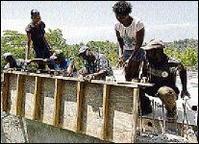Jarmila Jackson, Features Writer

Residents of communities from Port Antonio, Portland, decking a water catchment in their community as part of the LORBS water project. - Ian Allen/Staff Photographer
For years, residents of the districts of Lighthouse, Shot-Over, Ranchill, Spring Bank and Stony Hill in Portland have gone without roads, electricity and even bridges.
But the absence of running water makes life nearly impossible. So, determined to deal with the problem, residents took matters into their own hands in 2005 and formed the benevolent society LORBS.
"The majority of persons living in the communities are poor. Those who cannot afford to pay the $6,000 per trip to have water transported to them have to go to the springs, including the children who have to leave school on Tuesdays and Fridays. These are the 'wash days' when the pipes are full and it is easier to catch water," said Suzette Simpson, chairperson for the society.
Gruelling journey
It is a gruelling journey to the source and residents must fight the mountainous terrain as well as the weather, traveling what one describes as "60 chains of agony" to fetch water from either a spring or the Rio Grande. Many have lost their lives trying to catch water from the river when it rises in times of heavy rain. Since physical exertion is something the citizens are already used to, it did not take much to persuade them to extend their assistance for the construction of the water system that will be a well-needed improvement to their current standard of living.
The water project is one of seven programmes nominated for the 2008 Michael Manley Award for Community Self Reliance. The Norwich-Boundbrook Water Supply (still under construction) seeks to provide running water to 2,000 people throughout all five districts. The Jamaica Social Investment Fund has contributed 57 per cent of the funds necessary, leaving 43 per cent ($4.3 million) to be found by members of the community who, to a large extent, have given donations of land, cash and labour.

